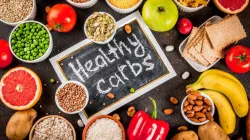Is the 80-10-10 diet a game-changer for weight loss? Let's explore
The 80/10/10 diet may lead to weight loss, so it's crucial to weigh the potential benefits against the risks. Consulting a registered dietitian is crucial before embarking on such a restrictive dietary approach to ensure it aligns with your individual needs and health goals.

In the ever-evolving landscape of diets promising health and weight management, the 80/10/10 diet stands out as a unique approach. Advocates of this eating regimen propose a simple formula: 80% carbohydrates, 10% fat, and 10% protein. But does this ratio truly hold the key to shedding unwanted pounds? Let's delve deeper into the principles and potential outcomes of the 80/10/10 diet.
Understanding the 80/10/10 diet:
The 80/10/10 diet, also known as the low-fat, raw vegan diet, emphasises consuming predominantly raw, plant-based foods. Carbohydrates take centre stage, comprising the majority of daily caloric intake, while fat and protein are limited to small portions.
Created by Dr. Douglas Graham, a former athlete and raw food advocate, this diet emphasises a specific macronutrient breakdown:
80% Carbohydrates: Primarily sourced from raw fruits and vegetables.
10% Protein: Derived from plant-based sources like nuts, seeds, and some vegetables.
10% Fat: Limited to nuts, seeds, and avocados.
This low-fat, high-carb composition promises various benefits, including weight loss.
Does It aid weight loss?
The primary question on many minds is whether the 80/10/10 diet effectively supports weight loss goals. Advocates suggest several mechanisms by which this eating plan may promote weight management:
Low caloric density: Fruits, vegetables, and other plant-based foods are generally low in calories compared to processed or animal-derived foods. By filling up on these nutrient-dense options, individuals may naturally consume fewer calories without feeling deprived.
High fibre content: Whole plant foods are rich in dietary fibre, which promotes satiety and regulates appetite. This can lead to reduced calorie intake and potentially contribute to weight loss over time.
Limited fat intake: With only 10% of calories coming from fat, the 80/10/10 diet inherently restricts high-calorie, fatty foods. This may help individuals control their overall calorie intake and support weight loss efforts.
Hydration: Many fruits and vegetables have high water content, contributing to hydration and a feeling of fullness. Proper hydration is essential for overall health and can also aid in weight management by reducing the likelihood of confusing thirst with hunger.
Potential considerations:
While the 80/10/10 diet boasts potential benefits for weight loss, it's essential to consider individual needs and preferences:
Nutritional adequacy: Strict adherence to this diet may pose challenges in meeting certain nutrient requirements, such as vitamin B12, iron, calcium, and omega-3 fatty acids. Supplementation or careful planning may be necessary to prevent deficiencies.
Personalisation: The 80/10/10 ratio may not be suitable for everyone. Factors such as activity level, metabolic rate, and health conditions can influence dietary needs. Consulting with a healthcare provider or registered dietitian can help tailor an eating plan to individual goals and requirements.
Sustainability: Adopting a predominantly raw, plant-based diet may require significant lifestyle adjustments for some individuals. Sustainability and long-term adherence are crucial factors in achieving lasting weight loss success.
The 80/10/10 diet presents a novel approach to weight management, emphasising whole, plant-based foods while restricting fat and protein intake. While some individuals may find success with this eating plan, others may encounter challenges in meeting nutritional needs or sustaining long-term adherence.